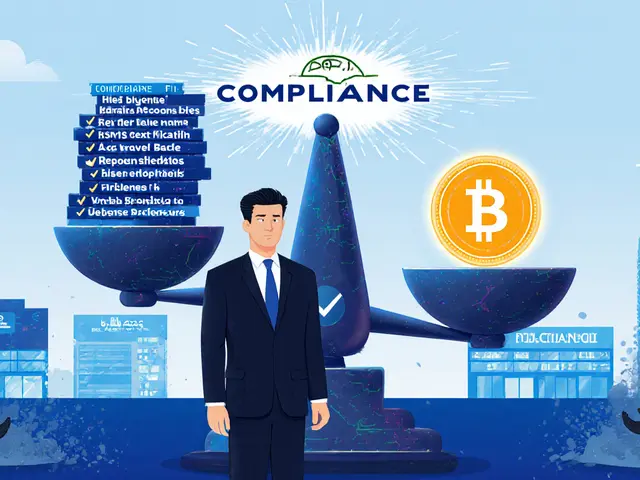South Korea Crypto Compliance Calculator
Corporate Holdings Calculator
Calculate your company's maximum allowable crypto holdings under South Korea's 5% rule.
Travel Rule Threshold Checker
Check if your crypto transaction exceeds South Korea's mandatory reporting threshold.
South Korea used to be one of the most restrictive countries when it came to cryptocurrency. In 2017, it banned ICOs. In 2020, it forced exchanges to lock down user identities with real-name bank accounts. For years, if you wanted to trade crypto here, you had to jump through hoops that felt designed to scare people away. But that’s not the story anymore. By 2025, South Korea’s Financial Services Commission (FSC) has completely flipped the script - not by removing rules, but by building a system that actually invites institutions in.
Legal, But Not Wild West
Crypto trading is legal in South Korea. That’s not up for debate. But legality here doesn’t mean free-for-all. The FSC made it clear from the start: if you run a crypto exchange in Korea, you’re not just a tech startup. You’re a financial service provider - and you’re subject to the same oversight as banks. The rules aren’t optional. They’re enforced with real consequences.Every exchange must connect to a real-name bank account system. That means if you want to deposit won into Upbit or Bithumb, you can’t just use any bank account. It has to be under your legal name, verified by the same financial institution that partners with the exchange. No anonymous wallets. No offshore transfers. No workarounds. The system is built to stop money laundering before it starts.
Security isn’t an afterthought either. Every exchange needs ISMS certification from the Korea Internet Security Agency (KISA). That’s not a checkbox. It’s a full audit of their infrastructure - how they store keys, how they handle breaches, how they monitor for intrusions. If you fail, you get shut down. And you don’t get a second chance.
The Travel Rule Is Real - And It’s Strict
South Korea doesn’t just follow the FATF Travel Rule. It enforces it with precision. If you send or receive more than KRW 1 million (about $750 USD) in crypto, the exchange must transmit the sender’s and receiver’s full names, account numbers, and addresses. This applies to every transaction - whether it’s BTC to ETH, or won to USDT. There are no exceptions for small wallets or casual traders. The system tracks everything.That’s why you won’t see peer-to-peer trading on Korean exchanges. It’s not that people don’t want it. It’s that the FSC doesn’t allow it. The only way to trade is through licensed platforms that log every move. This isn’t about privacy - it’s about accountability. And for regulators, that’s non-negotiable.
Only Four Exchanges? Not Anymore
Back in 2021, only four exchanges - Bithumb, Upbit, Coinone, and Korbit - had fully complied with the FSC’s rules. That gave them a near-monopoly. But by 2025, that’s changed. The FSC opened the door to new players, but only if they met every single requirement. Now, there are over a dozen licensed VASPs operating in Korea. The bar is high, but it’s the same for everyone.That’s a big shift. It means competition is alive. Users now have more choices - not because the rules got weaker, but because more companies could afford to play by them. The result? Better customer service, lower fees, and more innovation - all under watchful eyes.
Corporate Crypto Is Finally Coming
For nearly a decade, Korean companies were banned from holding crypto. No Tesla-style Bitcoin treasury. No corporate wallets. Even if your business made sense holding BTC or ETH, the FSC said no. That changed in early 2025.The FSC’s Virtual Asset Task Force proposed a phased approach: companies can now open KYC-verified accounts on licensed exchanges. But there are limits. No more than 5% of total assets can be held in crypto. All transactions must be reported. Audits are required quarterly. And no speculative trading - only treasury management.
Companies like Samsung SDS, LG CNS, and SK Group are already testing the waters. They’re not buying Bitcoin to flip it. They’re using it as a hedge against currency volatility, or as part of international payment systems. This isn’t gambling. It’s finance - and the FSC is treating it like that.

Spot Crypto ETFs Are Coming - Late 2025
If you’ve been waiting for a way to invest in crypto without holding it yourself, South Korea is about to give you one. The FSC announced in February 2025 that spot cryptocurrency ETFs will launch by the end of the year. These won’t be futures-based like in the U.S. They’ll track actual crypto prices on Korean exchanges.Think of it like an index fund - but for Bitcoin, Ethereum, and other major tokens. Pensions, mutual funds, and even retail investors through brokerage apps like Kiwoom and Hyundai Securities will be able to buy shares. The ETF sponsors must disclose their index methodology, publish net asset values in real time, and submit to full audits. No hidden fees. No manipulation. Just transparent exposure.
This is huge. It’s the first time Asia has moved this fast on spot crypto ETFs. The U.S. took years. South Korea did it in under a year after the law passed. Why? Because they built the infrastructure first - the compliance, the security, the reporting. Now they’re ready for the money.
NFTs and DeFi? Still in the Gray
Not everything is clear-cut. NFTs are treated case by case. If an NFT acts like a security - say, it promises profit-sharing or voting rights - it’s regulated like a stock. If it’s just a digital art piece or a collectible avatar? Then it’s mostly ignored. The FSC is watching, but not regulating yet.DeFi is even trickier. Most DeFi protocols are decentralized. No company. No headquarters. No Korean entity to regulate. So how does the FSC handle it? Right now, they’re focusing on the on-ramps. If a Korean exchange lists a DeFi token, it must verify the project’s smart contracts and disclose risks. If a Korean user uses a DeFi app to swap tokens, the exchange still has to report the transaction if it crosses KRW 1 million.
The FSC isn’t trying to shut down DeFi. They’re trying to keep it from leaking into the regulated system without oversight. It’s a balancing act - and they’re still figuring it out.
Taxes? Not Yet - But Coming
Right now, you don’t pay capital gains tax on crypto profits in South Korea. That’s a big reason why retail trading is still so active. But the government postponed the tax plan - not because they gave up, but because they’re designing it carefully.The next law will allow losses to offset gains in the same year. That means if you lost money on Solana but made it back on Bitcoin, you won’t be taxed on the net profit. It’s fairer. It’s smarter. And it’s coming. Experts expect it to launch in 2026, after the ETFs settle in.

Busan Is the Test Lab
While Seoul handles the big rules, Busan is where the future is being built. The Busan Digital Asset Nexus is a government-backed zone where startups can test Security Token Offerings (STOs) - tokens that represent real assets like real estate or shares. Foreign investors can participate here under special licenses, bypassing some of Korea’s usual restrictions.This isn’t a loophole. It’s a controlled experiment. If it works, Jeju and Incheon will copy it. If it fails, the FSC pulls the plug. Either way, they’re learning. And that’s the point. South Korea isn’t just reacting to global trends. It’s setting them.
Why This Matters
South Korea’s crypto regulations aren’t about control. They’re about credibility. By making compliance expensive and complex, they filtered out the scams. By requiring real names and security certs, they built trust. By opening the door to ETFs and corporate crypto, they invited the big money in.What you see today isn’t a crackdown. It’s a maturation. The FSC didn’t kill crypto. It professionalized it. And now, Korea isn’t just a market - it’s a model. Other countries are watching. Not because it’s easy. But because it works.
Are crypto exchanges legal in South Korea?
Yes, but only if they’re licensed by the Financial Services Commission (FSC). Exchanges must comply with real-name verification, ISMS security certification, AML/KYC rules, and the FATF Travel Rule. Unlicensed platforms are illegal and subject to shutdown.
Can I trade crypto without a real-name bank account in Korea?
No. All licensed exchanges require you to link a real-name bank account from the same financial institution. This is mandatory under Korea’s 2020 AML rules. You cannot deposit or withdraw funds without this verification.
Is Bitcoin taxed in South Korea in 2025?
As of 2025, profits from crypto trading are not taxed. However, the government has postponed the planned capital gains tax to 2026. When implemented, losses will be allowed to offset gains within the same tax year.
Can Korean companies own cryptocurrency?
Yes, since early 2025. Corporations can hold crypto through licensed exchanges, but they’re limited to 5% of total assets. All transactions must be reported, and crypto can only be used for treasury management - not speculation.
Are crypto ETFs available in South Korea yet?
Not yet, but spot crypto ETFs are expected to launch on the Korea Exchange by late 2025 or early 2026. These will be regulated, transparent, and accessible through brokerage platforms like Kiwoom and Hyundai Securities.
What’s the difference between NFTs and crypto tokens in Korea?
NFTs are treated based on function. If an NFT offers financial returns, voting rights, or payment use, it’s regulated as a virtual asset. If it’s purely collectible - like digital art or game items - it’s generally exempt from strict rules.
Why is Busan important for crypto in Korea?
Busan is Korea’s regulatory sandbox for Security Token Offerings (STOs) and foreign institutional crypto participation. It’s a test zone where new models can be tried under controlled conditions before being scaled nationally.
What Comes Next?
The big question now is whether the Virtual Asset Basic Law - expected to pass in September 2025 - will lock in this new era. If it does, South Korea won’t just be a crypto market. It’ll be a global standard-bearer for regulated digital finance.For traders, that means more stability. For investors, more access. For companies, more tools. And for the world? A new blueprint for how to bring crypto into the mainstream - without giving up control.


Arthur Coddington
This whole thing feels like a PR stunt dressed up as policy. They’re not building a system-they’re building a cage with gold-plated bars. You can trade, sure, but only if you’re willing to hand over your soul to a government-approved exchange. And don’t get me started on the ‘corporate treasury’ loophole-sounds like a backdoor for chaebols to gamble with taxpayer trust.
Phil Bradley
Let’s be real-South Korea didn’t suddenly become crypto-friendly. They just realized they couldn’t stop it, so they decided to monetize it instead. The ETFs? The corporate holdings? That’s not innovation. That’s capitalism with a side of bureaucracy. They turned Bitcoin into a spreadsheet.
Stephanie Platis
Actually, the FSC’s framework is remarkably well-structured-especially the Travel Rule enforcement and ISMS certification requirements. Unlike the U.S., where regulatory ambiguity encourages chaos, Korea has implemented clear, enforceable standards. This isn’t just ‘tight regulation’-it’s responsible governance. And yes, I’m using proper punctuation because clarity matters.
Michelle Elizabeth
It’s funny how people call this ‘professionalization.’ To me, it’s just crypto with a suit and tie-soulless, sterile, and painfully corporate. The moment you need a quarterly audit to hold a token, you’ve lost the whole point. I miss the wild west. At least then, it felt alive.
Joy Whitenburg
Y’all are overthinking this. Korea just said: ‘If you wanna play, you play by our rules.’ And honestly? That’s kinda cool. No shady wallets, no sketchy P2P, no rug pulls slipping through the cracks. It’s not perfect-but it’s safer than most places. I’ll take boring over bankrupt any day 😌
Kylie Stavinoha
What’s fascinating here isn’t the regulation-it’s the cultural shift. South Korea moved from fear to institutional integration without losing control. That’s rare. Most nations either ban crypto or let it run wild. Korea chose the third path: disciplined inclusion. It’s a quiet revolution, one that respects both innovation and order. And yes, I think that’s beautiful.
Diana Dodu
Don’t let them fool you. This isn’t about ‘credibility.’ It’s about control. They’re using crypto to funnel money into their own financial elite. The ‘licensed exchanges’? All connected to chaebol-backed banks. The ETFs? Designed for rich Koreans and foreign hedge funds. The little guy still gets locked out. This isn’t progress-it’s a power grab dressed in compliance.
Raymond Day
They’re lying. The ‘security certifications’? A joke. I’ve seen the audits-half of them are outsourced to firms that have ties to the exchanges themselves. And don’t even get me started on the ‘corporate treasury’ rule. 5%? That’s just the tip of the iceberg. They’re laundering institutional money under the guise of ‘hedging.’ 🤡
Noriko Yashiro
Busan’s sandbox is genius. Not because it’s a loophole, but because it’s a lab. Real asset tokenization could change how we think about ownership globally. Korea’s not trying to be the biggest-they’re trying to be the smartest. And honestly? That’s more valuable than any crypto bubble.
Atheeth Akash
Actually, this is one of the most balanced approaches I've seen. Not too strict, not too loose. Korea understands that crypto isn't going away, so they made it work within their system. Respect.
James Ragin
Mark my words: this ‘regulated’ system is just the first step. The Virtual Asset Basic Law? It’s the Trojan horse. Once they control the exchanges, they’ll track every wallet, every transaction, every movement-then they’ll freeze accounts, confiscate assets, and call it ‘anti-money laundering.’ This isn’t finance. It’s the beginning of digital serfdom. And they’re calling it progress. 🚩